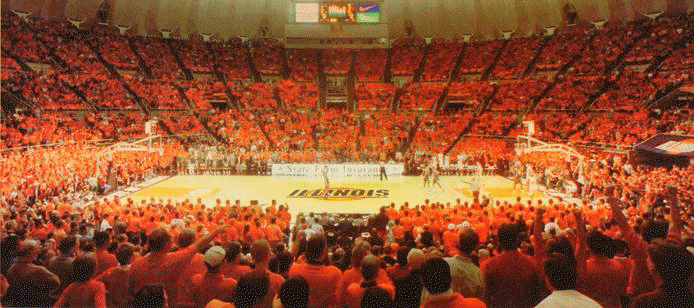On bridge and
basketball
Originally published in the June 2005 ACBL Bridge Bulletin
 This
past winter was an unusual one at my local bridge club. With one exception, our
games met as usual, but the atmosphere was a bit livelier. Our players were
caught up in the excitement of another game, and nothing -- blizzards, bad bids,
35-percent scores -- seemed to affect their pervasive good mood.
This
past winter was an unusual one at my local bridge club. With one exception, our
games met as usual, but the atmosphere was a bit livelier. Our players were
caught up in the excitement of another game, and nothing -- blizzards, bad bids,
35-percent scores -- seemed to affect their pervasive good mood.
For four months,
our hometown had been the putative Center of the Basketball Universe. Our
university's team was ranked number one in the nation and played a near-perfect
season. Their successes lit up the gray Midwest winter and transformed our small
city into a happy, orange-clad mass of fanatics.
Our local bridge
players were some of the team's most ardent supporters. Table conversation
revolved as much around basketball as bridge, and we spoke of the athletes as if
they were personal friends. Bridge players of all backgrounds -- college
students, businessmen, grandmothers -- joined in spirited discussions about
Dee's shooting percentage, Deron's assist-to-turnover ratio, Luther's hamstring
injury.
Interest was so
high that for the first time in 25 years, we canceled our Monday-night club game
on April 4. Our basketball team was playing in the national championship that
night, and even our most diehard members were going to be glued to their TV
sets. A lucky few even had tickets to the big game, only 175 miles away.
Although the
basketball talk was more fervent this year, our bridge group has always included
a good number of sports nuts. They've followed their favorite teams for years,
even through losing seasons, and many can offer quite sophisticated analysis to
anyone who's willing to listen.
You can probably
identify their counterparts at your local club. As a group, bridge players seem
to share an enthusiasm for sports. That's why tournament schedulers try to avoid
Superbowl weekend and why club attendance is down on nights of Final Four and
World Series games. It's why the organizers of the Pittsburgh NABC set up a
television outside the playing area during the first weekend of March Madness.
Do we develop
these dual interests because we're just natural game players? Is it because we
have a competitive spirit that carries over to contests of all kinds? Perhaps,
but it may also come from the fact that bridge players -- more so than many
other spectators -- are responding to the similarities between athletic
competitions and our own game.
Bridge is a sport
where we're participants, not just spectators. It doesn't matter that our game
doesn't get the media coverage of athletic events or that our champions don't
achieve rock-star status. When we enter a bridge game, the outcome depends on
how well we perform, and although the stakes aren't as high, we experience the
same highs and lows as athletes do during their games.
Some would call
it a stretch to compare bridge with athletic sports, or even to call bridge a
sport at all, but there are many parallels. The ancient Greeks justified their
participation in sports with the theory that a fit body would enhance the
workings of a fit mind. In modern times, that idea has given way to an obsession
with a fit body, but whatever the goal, all forms of competition have an
important mental element.
As Danny Ozark,
manager of the Philadelphia Phillies, so eloquently said of baseball: "Half
this game is 90-percent mental."
"Playing
smart" was what captivated us about our basketball team. They communicated
well, shared the scoring opportunities and made intelligent decisions under
pressure - and there wasn't a big ego among them. Those are qualities that any
fan can admire, and that bridge players aspire to in our own partnerships.
Our basketball
team didn't win the championship. They played hard, but ended a few points
short. Some fans were personally grieved, lamenting that this was supposed to be
"our year." Ask our local bridge players, though, and they'll say they
were disappointed not for themselves as fans, but for the athletes. As
competitors ourselves, we can empathize with the team's desire to win and their
pain in losing.
All of us have
come up a few points short in a bridge event that was important to us. Maybe
that's why bridge players are drawn to sports, and what makes us a little
different than the average fan. Like those basketball players, we enjoy testing
ourselves, and win or lose, we know the feeling of pride that comes from putting
forth our best effort.
That's the
competitive spirit that keeps us coming back to the bridge table … and leaving
between rounds to check basketball scores.
©
2005 Karen Walker
 This
past winter was an unusual one at my local bridge club. With one exception, our
games met as usual, but the atmosphere was a bit livelier. Our players were
caught up in the excitement of another game, and nothing -- blizzards, bad bids,
35-percent scores -- seemed to affect their pervasive good mood.
This
past winter was an unusual one at my local bridge club. With one exception, our
games met as usual, but the atmosphere was a bit livelier. Our players were
caught up in the excitement of another game, and nothing -- blizzards, bad bids,
35-percent scores -- seemed to affect their pervasive good mood.